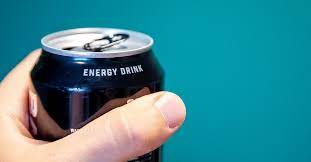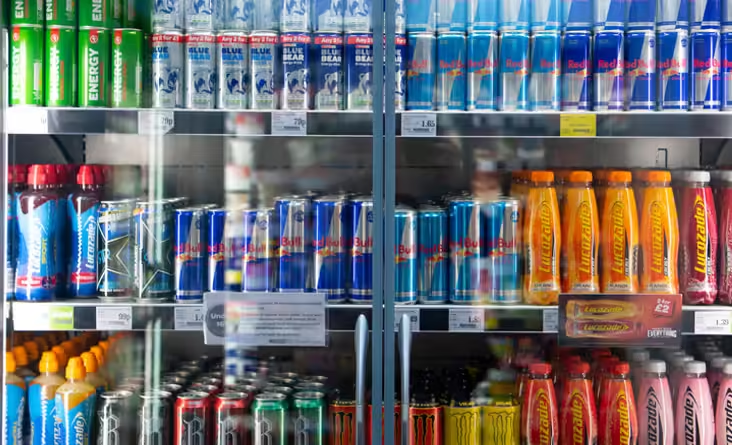Energy Drinks-Heart Attack Risk: Any Connection? 24
Energy drinks
Energy drinks, which are well-liked for increasing alertness and energy, have drawn criticism for possible health hazards. The association between energy drink use and heart attacks has received a lot of attention among these worries. This is especially pertinent to people who have specific inherited heart diseases, as drinking alcoholic drinks may increase the slight but significant chance of having a heart attack.

Energy drinks have a complicated chemical makeup that frequently includes high caffeine content in addition to other stimulants like taurine and guarana. Certain components may have “arrhythmogenic” qualities, which means they may induce arrhythmias, or abnormal heartbeats.
Caffeine is a well-known stimulant, but substances like taurine and guarana also have stimulatory properties that may have an increased effect on cardiac rhythm. Energy drink safety is called into question by this combination, particularly for people who are prone to heart problems.
Components and Possible Dangers
A normal serving of energy drinks has between 80 and 300 mg of caffeine, whereas an 8-ounce cup of brewed coffee has 100 mg. These drinks frequently contain additional stimulants—such as taurine and guarana—that are not subject to FDA regulation in addition to caffeine. Concerns concerning these unregulated compounds’ possible effects on heart health are raised by their existence.
Energy drinks are thought to include a combination of highly stimulating substances that can dramatically change physiological processes such as heart rate, blood pressure, cardiac contractility, and cardiac repolarization. These changes could increase the risk of arrhythmias by fostering an environment that is conducive to arrhythmias. For those who have underlying cardiac disorders or are predisposed to cardiac problems, these alterations in cardiac function are especially concerning.
These extra ingredients are uncontrolled, which makes evaluating their effects and safety more difficult. The effects of taurine, guarana, and other ingredients in energy drinks are less evident and call for more research, in contrast to caffeine, whose effects on the body are generally well understood.
It is crucial to use caution and moderation when consuming energy because these chemicals have the potential to interfere with regular heart function.
Notwithstanding these concerns, solid proof linking the use of energy drinks to heart attacks is still lacking. Present investigations have indicated potential associations; however, additional study is required to validate these assertions and investigate whether comparable hazards apply to the general population in the absence of pre-existing cardiac problems.
This research gap highlights the necessity of conducting thorough investigations to gain a deeper comprehension of the wider effects of energy drink intake on cardiovascular health.
Researchers from the Mayo Clinic in Minnesota looked at 144 recent survivors of sudden cardiac arrest who had pre-existing hereditary heart problems in a study that was published in the journal Heart Rhythm. They discovered that 7 individuals, or roughly 5%, had taken energy drinks prior to going into cardiac arrest, suggesting a potential connection between the health event and energy drink use.
The researchers stress that further, thorough research is required to prove causation and that this is only a connection. Still, the results are alarming enough to demand more research.
Please go through this article also
In a press release, lead study author Dr. Michael J. Ackerman, a genetic cardiologist at the Mayo Clinic and director of the Mayo Clinic Windland Smith Rice Sudden Death Genomics Laboratory, said, “Although the relative risk is small and the absolute risk of sudden death after consuming an energy drink is even smaller, patients with a known sudden death-predisposing genetic heart disease should weigh the risks and benefits of consuming such drinks.”
Not everyone who drinks energy drinks is susceptible to heart problems, and this study is not the first to raise concerns about their safety when ingested in large quantities.
Disregarding the other additives that are frequently added to energy drinks, like guarana and taurine, ingesting the high amounts of caffeine that are included in the majority of energy drinks might be harmful.
This was most recently demonstrated when Panera Bread was compelled to remove their highly caffeinated “Charged Lemonade” product from the market as a result of the deaths of a 46-year-old man and a 21-year-old lady.
The study was also discussed by interventional cardiologist Dr. Majid Basit of Memorial Hermann in Texas. As Basit stated in an interview with Medical News Today, “The study does not conclude that energy drinks cause these near-fatal events.” But he stressed that studies have linked frequent and excessive use of drugs and alcohol to a number of heart problems, such as atrial fibrillation, heart failure, and stroke.
For about two out of every 100,000 people with an electrical heart system issue, Dr. Basit brought attention to the possibility of sudden cardiac death. The speaker emphasized the significance of early detection of warning indicators that may require a cardiac test, such as a family history of unexplained death or a history of fainting.
The observations made by Dr. Basit highlight the wider effects of energy drink use on cardiovascular health. The study’s results, while not conclusive, do add to the mounting evidence that suggests energy drinks may carry serious hazards, particularly when ingested in excessive amounts.
This emphasizes the need for people to consider the possible risks of using energy drinks and to consult a doctor if they experience any worrisome symptoms, especially if they already have a cardiac disease.
In conclusion, even though energy drinks could provide you with a short energy boost, you shouldn’t ignore the problems they may cause, especially for your heart health. Particularly for those with genetic predispositions to cardiac issues, the potential arrhythmogenic effects of their constituents are concerning.
It emphasizes the necessity for a balanced awareness of both the benefits and risks of energy drinks, and care is suggested for individuals contemplating them until further conclusive research is completed.
It is critical that consumers understand the possible risks connected to the substances in these beverages as their popularity grows, especially for those who already have heart ailments or have a family history of cardiac problems.
Please note that the information provided in this article was collected from articles published by SciTech Daily, Medical News Today, and other relevant sources.
How do energy drinks affect your heart?
The Centers for Disease Control and Prevention (CDC) state that excessive levels of caffeine and other stimulants in energy drinks can raise blood pressure and heart rate. These two things increase the risk of heart disease.
Can energy drinks cause anxiety?
According to a study, youngsters who use energy drinks may have ADHD, anxiety, or sadness. According to research, kids who consume energy drinks may be more susceptible to melancholy, ADHD, poor sleep, and subpar academic achievement.
Are energy drinks addictive?
Abuse of alcohol and other addictive habits, such as smoking, is also linked to heavy caffeine usage. Regular caffeine users run the risk of developing psychological and physical dependence, as well as experiencing withdrawal symptoms, if their consumption is suddenly cut off.




